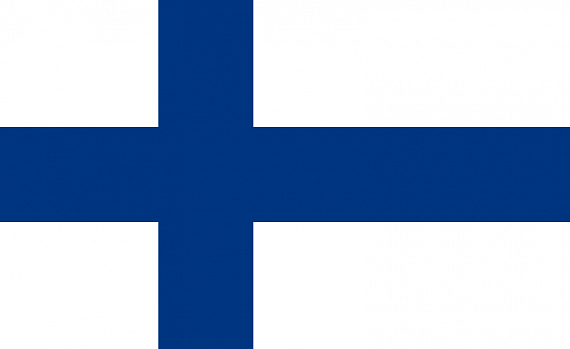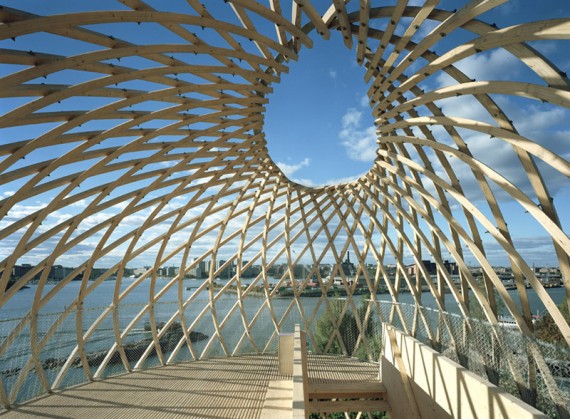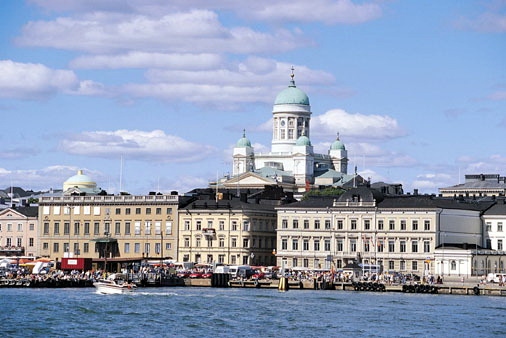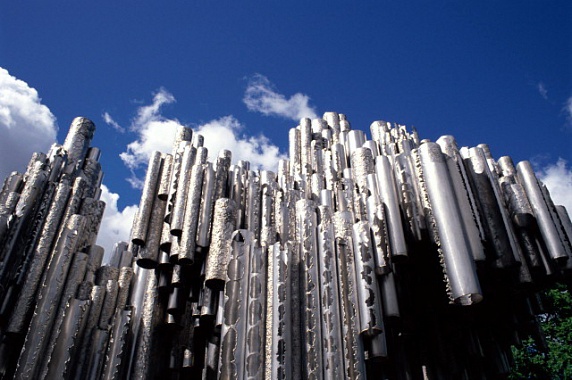 Финляндская Республика
Финляндская Республика
Speech by the Russian Foreign Minister, Sergey Lavrov, and his answers to questions from the mass media during the joint press conference summarizing the results of the negotiations with the Minister of Foreign Affairs of the Republic of Finland, Erkki Tuomioja, Turku, 9 June 2014
I would like to thank our hosts and Mr. Erkki Tuomioja, Minister of Foreign Affairs of Finland, for their hospitality and our productive talk. In keeping with tradition, we are maintaining our dialogue at a very good level: there have been three meetings between our presidents lately, three meetings of our prime ministers, the President of the Republic of Finland, Sauli Niinistц, and the Prime Minister, Jyrki Katainen, visited the Olympics in Sochi, we have regular communications with Erkki Tuomioja, our employees constantly maintain a dialogue. Our relations with Finland have an inherent value for us. They are characterised primarily by good-neighbourliness in all their dimensions, and we have entered into the level of strategic partnership in a range of sectors such as trade, economic and investment cooperation.
We would not like these mutually beneficial relations to be affected by some alien political factors, as is happening in the context of the European Union's general policy with regard to the Ukrainian crisis. Sessions of the Intergovernmental Commission on Trade and Economic Cooperation and other important events were postponed. We regret this and hope that these gaps will be filled in the very near future. In the long run, our relations are not related to anybody's whims or unilateral wishes, they are about a mutually beneficial partnership, the implementation of joint projects, which create new jobs and increase the welfare of our nationals. We need to appreciate this rather than sacrifice it to politicised approaches. In economics, we need to focus primarily on business circles, which understand the benefits and the prospects in this area, including with regard to the creation of new types of manufacturing, better than others. In this regard, I will note that despite the known appeals and pressure measures on behalf of the EU and US leaders, over 40 Finnish companies, including the leading ones, participated in the St. Petersburg International Economic Forum.
We share the opinion of our Finnish partners that the future of our trade and economic ties is in the development of cooperation, investment projects and high tech manufacturing, and there are the foundations for all of this. It is important that politicians from both sides help implement these prospects.
We also stated with satisfaction that dialogue in the areas of culture, humanitarian ties, and contacts between youth groups and between civil communities of the two countries in general are developing consistently.
I believe that our relationship is an example of how countries are guided by their root interests above all others. We expect that this will be a good example for many other partners of ours. In any case, we highly appreciate Finland's position in favour of consistent development of our strategic partnership with the EU, without artificial barriers, and the prevention of any attempts to politicise this process.
As to Ukraine, which, of course, was one of the central topics in our negotiations, if we put aside all the subtleties, we share the position that the common denominator there is the Geneva Statement of the 17 April and the "roadmap" of the Swiss presidency of the OSCE, which was prepared on the basis of it. These documents open up the path to a settlement, starting from the priority steps to stop the violence and organise an inclusive Ukraine-wide dialogue about a deep constitutional reform, taking into consideration each and all the political forces and all the regions of Ukraine.
We also agreed that urgent measures should be taken to improve the humanitarian situation in the South-East of Ukraine. We discussed the situation in Syria, including in the context of the need of urgent measures to ease the sufferings of civilians.
We value the balanced position of Finland on many international issues and our dialogue in many acute problems in world policy highly, we see serious potential for the mediation efforts of our Finnish friends, taking into account the status of their country. In particular, we actively support Finland's steps, as the country where we hope to convene a Conference on the creation of a zone free of weapons of mass destruction in the Middle East in the near future.
We have common priorities with regard to our cooperation in the North, in the Arctic Council (AC) and other bodies existing there. We support the initiative of the Republic of Finland about the creation of an Arctic Economic Council within the AC. The efforts of our Finnish friends are aimed at additional measures to increase the efficiency of the fight for preservation of the environment in the North.
In general, our talk today was very valuable, and, as Mr. Erkki Tuomioja said, it will continue. I thank our colleagues for their hospitality and cooperation again.
Question (to both ministers): What is Finland's position at the negotiations with Russia on the Ukrainian issue?
To what extent is the development of Ukraine according to the "Finnish scenario" acceptable to Russia: preservation of normal relations with all neighbours and distancing from NATO?
Sergey Lavrov (answers after Erkki Tuomioja): I agree with Erkki Tuomioja. Like any other country, we wish to see Ukraine as a free, democratic country, ensuring human rights, including language and other minority rights, as well as the opportunity to choose governors in the regions and freely promote their interests within a single state. I fully agree that Ukrainians should make their choice absolutely freely and independently, without external interference.
There were quite a lot of real cases of gross interference in the country's internal affairs in the last decade. It happened in 2004, when against all Ukrainian constitutional norms, western countries imposed an illegitimate third round of presidential elections. It has happened now as well, when supporters of an exclusively western orientation of Ukraine interfered in the normal flow of the constitutional process last November-December, and thus opposed themselves to the principle of the inadmissibility of forcing a country to make a choice between the East and the West, as Minister Erkki Tuomioja has just said. You probably recall (all this can be readily found on the internet) the quotes by leaders of the European Union countries, who requested that the Ukrainian people be provided with a choice to "freely choose their orientation towards the European Union". Can you see the difference? There is no choice: they could "freely" choose only one orientation – towards the West.
Now I am coming to the second part of this question. Choice should be free with regard to all the available options. However, a normal country can do this only if it fully considers all the obligations it has undertaken. Ukraine has its obligations, they are still in force in the CIS free trade zone, which was created at the initiative (even insistence) of Kiev. If Ukraine makes a free choice towards joining some economic association with another trade and economic union, then, of course, it should understand the consequences this will have on the obligations with regard to Ukraine according to valid CIS agreements.
There is another option, because interconnectivity in the modern world has acquired such dimensions that it is no longer possible to disregard some factors and devote more attention to other factors. We proposed gathering together many times to our European and Ukrainian colleagues and deciding how can we help Ukraine not to "tear itself apart", to the left or to the right, but to harmonise the processes within the CIS free trade area and the processes which Ukraine would like to join in the context of its cooperation with the EU. As far as we understand, Ukraine would not be against such an approach, yet our partners in the European Union do not want to talk about this seriously despite the agreements reached between the President of the Russian Federation, Vladimir Putin, the President of the European Council, Herman Van Rompuy, and the President of the European Commission, Josй Manuel Barroso, at the Russia-EU summit this January in Brussels.
We still believe that this would be an optimum way, and we are interested in such a development of events – our propositions are still on the negotiation table. We hope Russia, the European Union and Ukraine will agree on the building-up of our relations in this triangle, taking into consideration the integration processes in the East and in the West of the European continent and in Eurasia and find generally acceptable approaches. I emphasise that this would be a start to our dialogue, to what President Vladimir Putin called a common economic and humanitarian space stretching from the Atlantic to the Pacific Ocean.
As to the military and political dimension, in your question you asked what would Russia's attitude be, if Ukraine should choose Finland's path, including move away from NATO. The economic and humanitarian sectors are guided by the same criteria as the military and political area – the need to implement already existing obligations. All the countries of the European Atlantic region have the obligation to ensure the indivisibility of security in this region, which was accepted at summit level within the OSCE, according to which no country should ensure its own security at the expense of depriving others of their security. This is the common platform, on which we should build our relations between the countries in this region. It is not about moving away from NATO and moving closer to the CSTO or otherwise. I mean that at all stages of our cooperation with different military and political bodies we need to fulfil our basic obligations not to reinforce our security at the expense of the security of others. For example, all the countries of the Collective Security Treaty Organization, have quite a substantial programme of cooperation with NATO, there are many events in bilateral channels and within the framework of the Euro-Atlantic Partnership Council. Lack of membership of NATO does not prevent them from effective cooperation to fight the threats which are common to everybody.
Taking all these factors into consideration, the artificial attempt to expand NATO to the East or in any other direction, the moving of the military infrastructure closer to borders, including the borders of the Russian Federation, is certainly counter-productive. It is contrary to the obligations undertaken by NATO members within the framework of the OSCE and the Founding Act on Cooperation between NATO and the Russian Federation. I am convinced that in the context of the general understanding of the responsibility of each country of the European Atlantic region for the principle of equal and undivided security we can resolve all the problems without artificial strengthening and movement of dividing lines to the East.
Question: You have described the Russian-Finnish relationship in such a beautiful way. However, we have heard certain statements by Russian officials lately. In particular, an example of such a statement is the statement by the official representative of the Russian Ministry of Foreign Affairs in his interview to RIA Novosti, that some actions of Finland within the framework of the joint line of the European Union do not match the spirit of good-neighbourliness between our countries. I can also mention a more radical statement by a Russian political analyst, Sergey Markov, (he is also called a counsellor of the President), who cautioned Finland in his interview to Hufvudstadsbladet not to become a NATO member and even mentioned the possibility of starting a third world war in this regard. Are our relations really in such a state and have they degraded that much as these statements suggest? What is Finland's place in Russia's foreign policy?
Sergey Lavrov: I am convinced that you have scrupulously quoted the persons you mentioned. I am convinced that they have said much more than you can include in your short question.
I would like to caution against indulging in quotes of different community leaders and officials of our countries. They can lead too far.
As to the policy of the European Union with regard to Russia, I do not think that any serious politician would call it constructive. To be noted, such trends were observed long before the events which we call the Ukrainian crisis. For many years our partners in Brussels refused to complete their work on the new basic agreement, asking us to make additional unilateral concessions compared to the package which was agreed between Russia and the European Union, when our country acceded to the WTO. In fact, this is not only not constructive, it is unfair. For 18 years we have been agreeing with the European Union about one thing, as soon as we managed to agree, they started to request more. The agreements on a faster transfer to the visa-free regime and even some extra easements in the existing visa regime were disrupted using absolutely artificial causes. And this is despite the fact that all the required coordination has taken place. I emphasise once again, this happened long before the Ukrainian crisis.
The idea of a new energy strategy is being promoted in the European Union at the initiative of some countries. Several countries, which are not suspected of being fond of the development of a partnership between Russia and the European Union, want to use this initiative to disrupt the energy dialogue between Russia and the EU. We have some sufficiently serious achievements in this energy dialogue, including the North Stream, which significantly increased the energy security of the Northern European countries and the entire region. The negotiations about coordination of some aspects of the South Stream have started at the initiative of the European Commission.
Just recently, we have heard from Brussels that the negotiations on the South Stream will be frozen until Russia recognises the Kiev authorities. What do you think, is this constructive?
We don't understand what they want from us. We think we are doing everything we need with regard to Ukraine, yet we do not see any similar efforts from the other side. I hope that the contacts between the leaders of the European Union and the elected president Petro Poroshenko in Normandy will change the situation, and the new Kiev leader will implement his obligations about stopping violence and starting a dialogue with all the Ukrainian regions for the purposes of finding an agreement about their further co-existence.
I repeat, in general, I am not surprised that the position of the European Union is assessed as non-constructive. Brussels is guided by the wish to punish and take revenge, rather than a natural aspiration to ensure the legal and natural economic and other interests of its member states, through the EU's central bodies. However, we still hope that the processes currently taking place in the European Union, including according to the results of the elections to the European Parliament, will make the Brussels bureaucracy listen to the voice of the EU's majority, who look at the situation in a reasonable way and do not want any artificial confrontations. I hope that this position will prevail. I know that Finland belongs to that part of the EU members.
As to the Finland's place in the Russian foreign policy, Finland is our good and close neighbour, we have not let each other down for many years and decades. I am convinced that we will act in the same way in the future.











